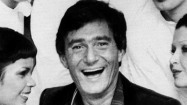- 1
- 2
- next
- | single page

Milwaukee Mayor Tom Barrett celebrates his primary victory Tuesday night, making him the Democratic challenger in Gov. Scott Walker's recall election June 5. (Morry Gash, Associated Press / May 8, 2012) |
MADISON, Wis. — When Tim Cullen returned to the Wisconsin state Senate after an absence of 24 years, he might have been an ideal bridge between the state's warring parties.
A former three-term Democratic Senate majority leader, Cullen had left the Legislature in 1987 to become an influential Cabinet secretary under then-Gov. Tommy Thompson, a Republican. He won his election in 2010 with significant support from both parties, representing one of the state's bellwether regions.
In his earlier terms in office, Cullen said recently in an interview, "it wasn't hard to find a political center around here" in which officials from both parties could maneuver. But now, he said, "there's no center."
As Wisconsin hurtles toward a June 5 recall election for its governor — only the third such contest in U.S. history — "there's no center" has become a refrain from voters and elected officials alike. The state has been buried under the weight of the forces that have reshaped politics nationwide — the influx of ideologically motivated money, the sharpened divide between the parties, the intolerance of heterodox views.
Polls show the state's voters are highly mobilized, deeply polarized and evenly divided over the future of their conservative Republican governor, Scott Walker, who drew national attention last year when he pushed a bill through the Legislature that eliminated collective bargaining rights for teachers and most other public employees.
A Marquette University Law School poll released last week showed Walker and his Democratic opponent, Milwaukee Mayor Tom Barrett, in a dead heat with only 4% of voters undecided.
"I've been saying there are only 37 undecided voters left in the state, and we're all chasing them," joked Barrett, who won Tuesday's Democratic primary to face Walker.
The changes in Wisconsin's politics have delivered a society that is at once more involved and more divided. Voter apathy has vanished, but so too has much of Wisconsin's vaunted civility.
Nearly 1 in 5 of the state's voters say they've attended a demonstration or rally over the last 16 months, according to the Marquette survey — far more than normal even for a presidential contest. One in five said they had contributed money. Half said they had tried to persuade others to vote their way.
When he served in the Legislature a generation ago, said Mordecai Lee, who now teaches political science at University of Wisconsin-Milwaukee, voters "had very little interest" in state government. "A million times I'd have voters say to me, 'It doesn't matter if I vote. It doesn't matter which party wins.'
"Nobody says any of those things any more."
That heightened interest comes at a price. Nearly 30% of people in the Marquette poll said they had stopped speaking to someone they knew because of political disagreements. Voters across the state in recent interviews talked of family gatherings disrupted, book groups and golf foursomes broken up and longtime friendships dissolved in partisan rancor.
The recall split her family at Christmas, said Terri Spring, 59, a fundraiser for a children's hospital in Madison and an active Democrat. Her sister-in-law objected to her recall petitions.
"We don't understand her viewpoint at all," said Spring, who was raised in a pro-union household. "We think everything in our life is on the line. It's hard to understand people on the other side."
For Michael Wozniak, a 40-year-old Walker supporter who owns a security company, the problem was his brother-in-law, a member of a private-sector union. "As soon as the conversation starts, he storms out of the room," Wozniak said as he waited for Walker to appear at a recent rally in the Milwaukee suburb of Oak Creek.
"Entrepreneurship and opportunity, that's what's worked for America," Wozniak said, recounting how he had worked three jobs to pull himself up. "Effort and hard work, anybody can do it. There are no barriers in this country. Self-responsibility, that's the bottom line."
Walker's decision to take on the public employee unions made him a hero to conservative groups nationwide and a villain to unions. In January, his opponents delivered recall petitions with more than 900,000 signatures, an astounding total given that Walker had won just over 1.1 million votes in his 2010 election.
But though Walker's move on bargaining was the spark that lighted Wisconsin's explosion, the powder had been piling up for much of the last decade.
Spending on campaigns has increased vastly, as it has elsewhere — up 87% for Wisconsin legislative races between 2002 and 2010, for example. Much of that money comes from ideologically motivated interest groups on either side who often outspend the candidates, said Mike McCabe of the Wisconsin Democracy Campaign, which monitors election spending.
With outside groups spending so heavily, "legislators have become bit players in their own elections," said state Sen. Dale Schultz, the former Senate Republican leader who was the only member of his caucus to vote against Walker's collective bargaining bill. That, in turn, has heightened pressure for ideological conformity.
















